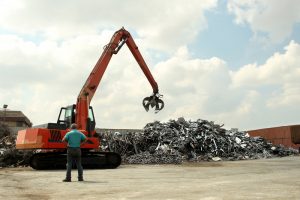The National Safety Council (NSC), in partnership with the NCCCO Foundation, has published “Addressing Heat Stress in the Crane Industry,” a new report that aims to help employers combat heat-related injuries and illnesses, the group announced July 3.
The report, published through the NSC’s Work to Zero initiative, offers targeted recommendations to protect crane workers from high-heat hazards, including:
- Comprehensive approach. Effective heat stress management requires a holistic approach combining on-site prevention, environmental monitoring, and clearly defined heat safety policies and procedures.
- Work practice adjustments. Implementing small but strategic changes can significantly reduce risk, such as structured work/rest cycles, cooling stations, or acclimatization schedules.
- Worker education. Education and training are critical in addressing individual vulnerabilities related to hydration, medical history, and substance use.
- Technology integration. Wearable devices and lone worker technologies offer real-time alerts and hazard monitoring for added protection.
The Work to Zero and NCCCO Foundation surveyed more than 2,000 crane personnel. Three in four respondents reported being “likely” or “very likely” to have experienced heat stress or illness while working.
OSHA cites Florida missile manufacturer
The Occupational Safety and Health Administration (OSHA) cited an Orlando target-missile manufacturer for exposing workers to fire, burn, and inhalation hazards following a December 2024 fire at the facility, the agency announced July 8. Two employees were hospitalized, and others were injured.
Agency investigators found that two employees of Aerojet Rocketdyne Coleman Aerospace Inc. were severely burned, and another sustained injuries from burns and smoke inhalation while working on a missile component. The agency also determined that the employer exposed other workers to burn and inhalation hazards from incorrectly stored and handled explosives and from failing to classify the physical hazards of a highly reactive chemical.
The employer was cited with one willful and six serious violations, with proposed penalties totaling $262,451.
Cal/OSHA issues another wildfire smoke caution
On July 7, the California Division of Occupational Safety and Health (Cal/OSHA) urged employers to take steps to protect workers from exposure to unhealthy air caused by wildfire smoke as the Madre Fire continues to affect air quality and has generated hazardous smoke that could impair workers’ health in San Luis Obispo County and across Southern California.
Cal/OSHA’s Wildfire Smoke standard requires employers to protect workers from unhealthy air due to wildfire smoke. Employers must monitor air quality, adjust work practices, and provide N95 filtering facepiece respirators (FFRs) for voluntary use. Cal/OSHA’s standard also contains training requirements.
Employers must monitor the Air Quality Index (AQI) for particulate matter (PM2.5) before and throughout a work shift.
When the AQI for PM2.5 exceeds 150, the employer must provide respirators to all workers and encourage them to use them. When the AQI for PM2.5 exceeds 500, respirator use is required.
CSB urges chemical manufacturers to prepare for hurricanes
On July 2, the U.S. Chemical Safety and Hazard Investigation Board (CSB) urged petroleum and chemical facilities to prepare to help prevent catastrophic chemical releases during hurricane season and ensure the safety of workers, emergency responders, and surrounding communities.
The CSB recommended that chemical facilities review the hurricane preparedness materials the CSB has developed over the years. The CSB’s guidance builds on lessons learned from past hurricanes and other extreme weather events, including Harvey, Laura, and Ida, that resulted in severe damage to chemical facilities.
CSB resources include:
- “Extreme Weather, Extreme Consequences: CSB Investigation of the Arkema Crosby Facility and Hurricane Harvey”
- Final Report: Arkema Inc. Chemical Plant Final Investigation Report
- “Fire from the Storm: Chemical Release at Bio-Lab”—Safety video
- “Caught in the Storm: Extreme Weather Hazards”—Safety video

